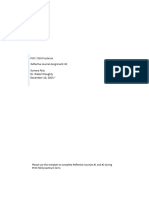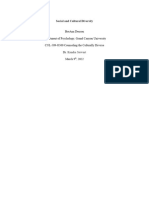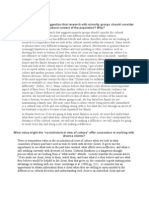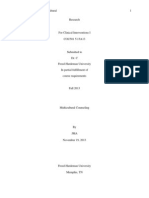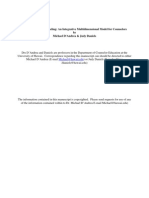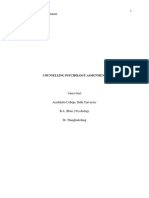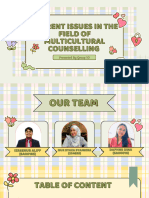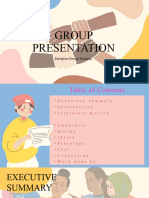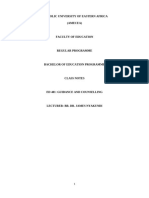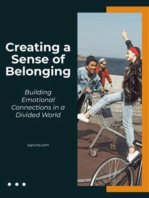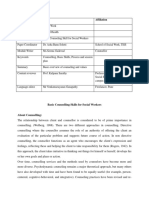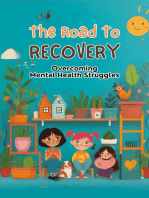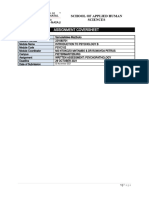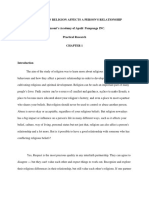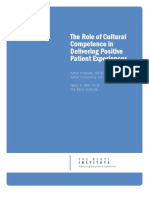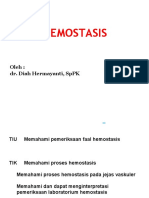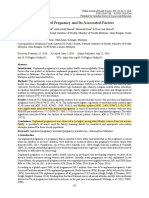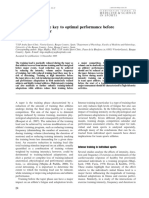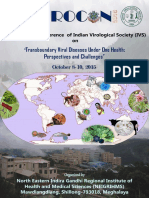Counselling Assignment 1
Counselling Assignment 1
Uploaded by
Zainab HafizCopyright:
Available Formats
Counselling Assignment 1
Counselling Assignment 1
Uploaded by
Zainab HafizOriginal Description:
Copyright
Available Formats
Share this document
Did you find this document useful?
Is this content inappropriate?
Copyright:
Available Formats
Counselling Assignment 1
Counselling Assignment 1
Uploaded by
Zainab HafizCopyright:
Available Formats
Faculty of Education, Languages & Psychology
Name (According to NRIC/Passport): NRIC/Passport Number:
Zainab Hafiz Shaikh S9866165
SEGi Student ID:
SUKD2001613
Current Semester: Course Lecturer: Priscilla Malar A/P Lawrence
Semester: Year 2 Semester 3
Course Code: PSY2104 Course Name: Counselling skills
Assignment Deadline: 14/07/2023 Date of Submission: 10/07/2023
Topic: Describe ways in which you hold privilege in terms of gender, race, ethnicity, sexual
orientation, and country of origin. How do you believe these aspects of privilege might affect
your communication with clients who vary from you on these dimensions?
I am submitting (please tick the appropriate box)
Soft copy via Email/ Turnitin Hardcopy document of ( ) pages
Mental health practitioners face and address a fair number of challenges on a frequent
basis. They are individuals before anything and professionals second. Every human being has
the underlying desire to build and develop their own basic principles and belief systems as
they progress through their lives (BetterLYF Team, 2021). However, as a counsellor, it is
essential to bear in mind to leave personal biases and thoughts at the door before deciding to
assist someone (BetterLYF Team, 2021). A counsellor's objective is to encourage productive
thinking and assist a person with making decisions on their own and coming up with concepts
of their own, as opposed to presenting them with direct approaches, which may be quite
subjective in nature (BetterLYF Team, 2021). Gender, race, ethnicity, and other factors may
be evaluated prior to sitting down for a session with a therapist about their feelings.
Gender is one of the factors an individual might consider before seeking therapy; this
is essential because it can contribute to progress. This is especially significant if the client has
concerns about their sexual orientation or their gender identity. Some people may find it less
complex to express themselves to someone of their own gender (Sana Counselling Inc.,
2022). This could be because they feel that it is easier for them to be understood and
accepted. Women, for example, may connect to and appreciate women more in the
experiences they have in common and thus empathise well, whereas male therapists with
female clients may be unable to do so. Some people's choices about the gender of their
counsellor may be driven by cultural or religious views. Having a therapist who comes from
the same culture or faith not only offers a safe environment to be honest and open with, but it
also spares you the time and effort of explaining issues that have been grasped by someone
who has had similar encounters as you (Sana Counselling Inc., 2022). According to research,
males are less likely than women to seek therapy as a means of healing. They prefer to lock
up their inner distress (Connected Brain Counselling, 2022). Thus, if they do decide to seek
counselling, they may prefer to collaborate with a same-gender therapist since they feel more
relaxed and can quickly create connections. Furthermore, studies have shown that male
clients prefer male counsellors who tend to be more direct and governing, whereas female
clients prefer female counsellors who are kinder and helpful (Connected Brain Counselling,
2022). Gender can be a barrier since it can be hard for a counsellor to relate to their client
who is of the opposing gender because they are so unique (Sana Counselling Inc., 2022).
However, it is the counsellor's duty to overcome these challenges and discover solutions
because their main objective is to assist their client. Due to the fact that we share the same
gender, female clients will be more likely to prefer me as their counsellor. This is particularly
significant if they have experienced trauma or sexual assault at some point by a man, as they
may feel that seeing a female counsellor would be less stressful because a male therapist
could bring up those traumatic events or cause them more anxiety.
Effective facilitators must be aware of their own racial/cultural identity. Without
being conscious of their own perspective, particularly their beliefs, presumptions, prejudices,
and stereotypes about behaviour among people, counsellors cannot be good helpers (Sue,
2015). Additionally, counsellors have to recognise and be prepared to admit any bias based
on race (Sue, 2015). Participants that voice out when it feels uncomfortable to do so should
be supported, validated, and be shown their respect and gratitude (Sue, 2015). As someone
who is in touch with Indian culture, it allows me to understand and appreciate the culture of
others. Due to the fact that there are many cultures existing in India today. It can cause issues
with communication due to the difference in race, ethnicity and culture. These issues can
become a hindrance in communication with the client as well as it could cause
misunderstandings. Understanding that being a person of colour comes with the responsibility
to be aware of how much harder it can be for others who have gone through harsh
circumstances. The reason why it is hard for counselling to become an accepted notion in
India, is because Indian culture has prepared its people from over the ages to approach their
existence instinctively, experimentally and within a community. India's population views
mental illness as an issue that degrades the family's honour or reputation, which further
contributes to the stigma associated with it. People with mental illnesses are sometimes
viewed as being cursed or sinful in various cultures, and rather than seeking therapy from
doctors, people with mental illnesses sometimes turn to religious counsellors, village healers,
and elderly relatives for "treatment." Even if beliefs are not at fault in this case, strongly held
religious values and a lack of understanding of mental illness limit Indians from getting
clinical assistance or counselling.
Sexual orientation is still an idea that is very sensitive in India. I come from a very
religious family that does not support the LGBTQ+ community. However, we are also the
kind of people that do not believe in harming others because of their choices. Personally, I
live with a mindset of staying in my own lane and minding my business. Their decisions
should not bother or hinder the way I live and in return I have no right to bother them.
However, India is slowly changing. In September 2018, the Supreme Court issued an order
that legalised homosexuality (Clay, 2019). Individuals have been subjected to assault,
physical abuse, and intimidation before the law was put in place (Clay, 2019). People treated
them with cruelty. Some have been driven into loveless and painful marriages; other couples
have fled together or even committed suicide together (Clay, 2019). Because of a lack of
knowledge, close family members and friends hold the view that having a separate sexual
orientation or sexual identity is an indication of disease (Clay, 2019). They send them to a
doctor or seek spiritual guidance to ensure that the correct things happen as soon as someone
confesses the truth about themselves (Aware Mental health, n.d.). Many people struggle in
solitary when their family and friends condemn and address them harshly when they share
their thoughts about sexuality. When people they trust drive LGBTQ individuals into
alienation and disappointment, they may suffer from feelings of sadness and anxiety, in
addition to diminished self-worth and confidence in themselves (Aware Mental health, n.d.).
In the Indian family, the duties of everyone in the family are clearly defined. The
father is the family's leader, authoritative figure, and provider. The mother's function is one of
kindness. She typically is in charge of the children and household duties. Some Asian Indian
families that have relocated to different regions of the world may not have such customary
roles. As a result, the counsellor must enquire and identify how their client's family stands
with regard to these responsibilities. The same goes for my family, since we left India almost
as soon as I was born, I have been raised in Malaysia ever since then. Even though at home, I
speak in my mother tongue which is Hindi and my mother cooks’ traditional Indian meals
every day, we still aren’t traditional Indians and have been very much influenced by the
Malaysian culture. Difficulties experienced by any member of an Asian Indian family are
seen and solved collectively as family problems. As a result, how families interact around an
issue is important. Asian Indian families receive a lot of help and encouragement from their
family as well (Seegobin, 1999). It is not uncommon for parents to make trips to their
children who live far away from them for a long amount of time. Close relatives are often
known to offer one other money. Counsellors must recognise, however, that this connection
frequently supports the family in moments of difficulty and also offers a great deal of
emotional and social reinforcement (Seegobin, 1999).
In conclusion, counselling is important for people as it can help to regulate their
emotions, help better their relationships with their family and friends and helps with
communication as well. It also helps to build confidence in a person. That being said, it is
important for a counsellor to be competent and properly equipped with knowledge. It is
important that a counsellor recognise their ability to help someone and if they can't do so,
they must also be able to recognise that and make referrals. They also need to be aware of the
many cultures their clients may come from, so that they can provide them with the type of
help they need and not send them back with despair. It is also important for a counsellor to be
able to set boundaries with their clients, so that they can maintain a healthy relationship. It is
also important so as to avoid anything from going wrong.
References
Aware Mental health. (n.d.). lgbtq therapy and counselling — Aware - Online
counselling In India. Aware Mental Health. Retrieved July 6, 2023, from
https://awaremh.com/lgbtq-therapy-and-counselling/
BetterLYF Team. (2021, February 10). Challenges in Counselling | Challenges
Faced by Counselors. BetterLYF. https://www.betterlyf.com/articles/stress-and-
anxiety/challenges-in-counselling
Clay, R. A. (2019, February 1). Decriminalizing homosexuality in India. American
Psychological Association. https://www.apa.org/monitor/2019/02/homosexuality-
india
Connected Brain Counselling. (2022). Should I Choose A Male or Female Therapist:
How Gender Affects Counseling. Connected Brain Counseling.
https://www.connectedbraincounseling.com/post/how-does-gender-affect-counseling
Sana Counselling Inc. (2022, January 18). How Gender Can Affect Counselling —
Sana Counselling. Sana Counselling. https://sanacounselling.ca/blog/how-gender-can-
affect-councelling
Seegobin, W. (1999). Important Considerations in Counseling Asian Indians. George
Fox University.
chrome-extension://efaidnbmnnnibpcajpcglclefindmkaj/https://digitalcommons.georg
efox.edu/cgi/viewcontent.cgi?
referer=&httpsredir=1&article=1123&context=gscp_fac
Sue, D. W. (2015, December 22). Race talk and facilitating difficult racial dialogues
- Counseling Today. Counseling Today. https://ct.counseling.org/2015/12/race-talk-
and-facilitating-difficult-racial-dialogues/
Individual Assignment
Marks
Marking Criteria Applied Examiner’s comment
awarded
Knowledge and Understanding of Subject
Extent of knowledge and understanding of
concepts and underlying principles associated
with the discipline.
Analysis
Analysis, evaluation and synthesis; logic,
argument and judgement; analytical reflection;
organisation of ideas and evidence; and
convenient flow of discussions.
Practical Application and Deployment
Deployment of methods, materials, tools and
techniques; application of concepts;
formulation of innovative and creative
solutions to solve problems; and adherence to
the report submission requirements.
Attributes in professional practice: individual
and collaborative working; deployment of
appropriate media including proper usage of
tables and appendices in supporting the
report; presentation and organisation,
evidence of good language or proof-reading
done.
TOTAL
You might also like
- TM 9-2320-427-10 M1070a1Document1,072 pagesTM 9-2320-427-10 M1070a1Advocate89% (9)
- Sumara Riaz PSYC7203 Reflective Journal 286Document14 pagesSumara Riaz PSYC7203 Reflective Journal 286Sumara RiazNo ratings yet
- 40-Hr SSM Student Manual DD 10-20-21 Full With AppendixDocument171 pages40-Hr SSM Student Manual DD 10-20-21 Full With AppendixHamonaesdrasNo ratings yet
- Gay Subculture IdentificationDocument12 pagesGay Subculture Identificationjera_96No ratings yet
- 1 Official Synthesis EssayDocument9 pages1 Official Synthesis Essayapi-461616923No ratings yet
- Social and Cultural Diversity-2Document9 pagesSocial and Cultural Diversity-2api-736702714No ratings yet
- Rohjani Alvarado - Personal Bias and Counseling EssayDocument6 pagesRohjani Alvarado - Personal Bias and Counseling Essayenrique palenciaNo ratings yet
- Answer 1Document10 pagesAnswer 1Hezekiah AtindaNo ratings yet
- Discussion Boards 1 Through 4Document7 pagesDiscussion Boards 1 Through 4shankfootballNo ratings yet
- Attachment 1Document8 pagesAttachment 1Hezekiah AtindaNo ratings yet
- cnl-509 Social and Cultural DiversityDocument9 pagescnl-509 Social and Cultural Diversityapi-742559605No ratings yet
- A Cultural and Social Foundations Case StudyDocument12 pagesA Cultural and Social Foundations Case StudygaydosikNo ratings yet
- Discussion Responses MulticulturalDocument9 pagesDiscussion Responses MulticulturalJoe MbungaNo ratings yet
- Multicultural CounselingDocument10 pagesMulticultural CounselingJerika AvingtonNo ratings yet
- Culture-centered Counseling ACA 2021(1)Document10 pagesCulture-centered Counseling ACA 2021(1)loribyrneasjjNo ratings yet
- Multicultural Orietation-1Document8 pagesMulticultural Orietation-1Twain AntonyNo ratings yet
- Reading Assignment-Albanian Help Seeking BehaviorDocument19 pagesReading Assignment-Albanian Help Seeking Behaviormmjp0170No ratings yet
- Professionals and Practitioners in CounselingDocument28 pagesProfessionals and Practitioners in Counselingmarry janeNo ratings yet
- HANDOUTSDocument2 pagesHANDOUTSIan MaghanoyNo ratings yet
- Introduction For Education EssayDocument4 pagesIntroduction For Education Essayafibyoeleadrti100% (1)
- Revised-Peer Counselling-Power PointsDocument94 pagesRevised-Peer Counselling-Power PointsAlex OmungaNo ratings yet
- Breaking the Silence: Understanding and Addressing Mental Health Challenges in Black YouthFrom EverandBreaking the Silence: Understanding and Addressing Mental Health Challenges in Black YouthNo ratings yet
- MAKALAH GROUP 2 CCC (PART II)Document16 pagesMAKALAH GROUP 2 CCC (PART II)Hasna SainiNo ratings yet
- Resume Viii - Azahra HCDocument10 pagesResume Viii - Azahra HCazahra hardi cusiniaNo ratings yet
- Respectful CounselingDocument48 pagesRespectful CounselingAckeem Salmon67% (3)
- Positive Affirmations for Anxious Couples: Learn How to Handle Your Relationship Problems and Live a Happy Life. Manage Conflicts, Boost Trust and Improve Communication. With 971 Affirmations!From EverandPositive Affirmations for Anxious Couples: Learn How to Handle Your Relationship Problems and Live a Happy Life. Manage Conflicts, Boost Trust and Improve Communication. With 971 Affirmations!No ratings yet
- Counselling AssignmentDocument7 pagesCounselling Assignmentykdfxb829pNo ratings yet
- Multicultural Counseling Applied To Vocational RehabilitationDocument16 pagesMulticultural Counseling Applied To Vocational RehabilitationMichele Eileen Salas100% (1)
- Assertiveness Training Guide The Importance of Connecting Physical, Intellectual, Emotional, and Spiritual Energies to Build Strong Relationships with PeopleFrom EverandAssertiveness Training Guide The Importance of Connecting Physical, Intellectual, Emotional, and Spiritual Energies to Build Strong Relationships with PeopleNo ratings yet
- Multicultural ReflectionDocument6 pagesMulticultural ReflectionUmaimahNo ratings yet
- Current Issues in The Field of Multicultural Counselling (Group 10)Document21 pagesCurrent Issues in The Field of Multicultural Counselling (Group 10)Izreenur AliffNo ratings yet
- Provider Personality, A Simple Guide To The Condition, Diagnosis, Treatment And Related ConditionsFrom EverandProvider Personality, A Simple Guide To The Condition, Diagnosis, Treatment And Related ConditionsNo ratings yet
- Design Thinking - PresentationDocument36 pagesDesign Thinking - Presentationmahnooramirbutt1901211gNo ratings yet
- Inquiry Project ReportDocument3 pagesInquiry Project Reportapi-321379242No ratings yet
- Ed 401 Guidance and Counselling Class Notes Week One 2022 2Document137 pagesEd 401 Guidance and Counselling Class Notes Week One 2022 2chisakajesseNo ratings yet
- Missionary Response Bulan Baps 3Document2 pagesMissionary Response Bulan Baps 3Kenneth MoralesNo ratings yet
- Establishing Respectful Relationship With People With Mental Health IssuesDocument5 pagesEstablishing Respectful Relationship With People With Mental Health IssuesTasbirNo ratings yet
- Pysc 102Document4 pagesPysc 102Cindy NgwenyaNo ratings yet
- Creating a Sense of Belonging: Building Emotional Connections in a Divided WorldFrom EverandCreating a Sense of Belonging: Building Emotional Connections in a Divided WorldNo ratings yet
- Ethics Paper - Midterm Exam DRaft.Document9 pagesEthics Paper - Midterm Exam DRaft.CAIRAH PAYUSANNo ratings yet
- Negativity Neutralized: Navigating Challenging Relationships with GraceFrom EverandNegativity Neutralized: Navigating Challenging Relationships with GraceNo ratings yet
- The Good Stuff: Practical Positive Supports for People with Intellectual and Developmental Disabilities and Mental IllnessFrom EverandThe Good Stuff: Practical Positive Supports for People with Intellectual and Developmental Disabilities and Mental IllnessDaniel J. BakerNo ratings yet
- Family Literacy BookletDocument27 pagesFamily Literacy BookletDanielle GabrielliNo ratings yet
- Multicultural Competence - Case StudyDocument4 pagesMulticultural Competence - Case StudyimmaNo ratings yet
- How To Be An Effective Counselor in A Multicultural Setting.Document5 pagesHow To Be An Effective Counselor in A Multicultural Setting.empezardc0% (1)
- Human Sexuality in CounselingDocument6 pagesHuman Sexuality in CounselingJoseph GathuaNo ratings yet
- Counselling AssignmentDocument3 pagesCounselling AssignmentVISHAKHA SHARMANo ratings yet
- Just As They May Lie To Cover Their Own Faults.: Morrison, (2017)Document5 pagesJust As They May Lie To Cover Their Own Faults.: Morrison, (2017)hopeIshanzaNo ratings yet
- 1501569676XIX BasicounsellingskillsforSocialWorkers TextDocument10 pages1501569676XIX BasicounsellingskillsforSocialWorkers TextRoberto AlejandroNo ratings yet
- Defying Mental Illness: Finding Recovery with Community Resources and Family SupportFrom EverandDefying Mental Illness: Finding Recovery with Community Resources and Family SupportNo ratings yet
- Cultural Competency PlanDocument6 pagesCultural Competency Planapi-455750025No ratings yet
- Ed 401 Guidance and Counselling Notes Weeks 1 & 2, 3Document27 pagesEd 401 Guidance and Counselling Notes Weeks 1 & 2, 3marionchepkemboi2003No ratings yet
- Empathy (Textbook)Document5 pagesEmpathy (Textbook)Doris NguyenNo ratings yet
- Pysc102 SamkelisiweDocument4 pagesPysc102 SamkelisiweCindy NgwenyaNo ratings yet
- Multiculturalism in CounselingDocument11 pagesMulticulturalism in Counselingsospeter obong'oNo ratings yet
- Document 2Document9 pagesDocument 2Aisha M BarizoNo ratings yet
- ExaaaaamDocument3 pagesExaaaaamDesNo ratings yet
- Cultural Competence Importance in HealthcareDocument20 pagesCultural Competence Importance in Healthcaresaharconsulting100% (6)
- Intro To Health EconomicsDocument34 pagesIntro To Health EconomicsRasha ElzenyNo ratings yet
- Correlation Between Bod Cod and TocDocument3 pagesCorrelation Between Bod Cod and TocShivangi MishraNo ratings yet
- Deadlift Program PDFDocument7 pagesDeadlift Program PDFp300644No ratings yet
- 2018 - Praticas para TEADocument6 pages2018 - Praticas para TEARenata BarretoNo ratings yet
- 5-194 - Kru276 Eng PDFDocument1 page5-194 - Kru276 Eng PDFMoslemNo ratings yet
- Partura SchmitzDocument8 pagesPartura Schmitzretno safitriNo ratings yet
- JSM2016 ProgramBookDocument311 pagesJSM2016 ProgramBookkensaiiNo ratings yet
- Food Safety and Hygiene 3Document12 pagesFood Safety and Hygiene 3mtkhan52-1No ratings yet
- Health Promotion and Health Education 11.24.22Document99 pagesHealth Promotion and Health Education 11.24.22Compilation 2021No ratings yet
- EM - 30 Electrical SafetyDocument3 pagesEM - 30 Electrical SafetyRaja RamNo ratings yet
- Radiographic Standard Operating ProtocolsDocument215 pagesRadiographic Standard Operating ProtocolsIsaias Orlando Muchaypiña CanalesNo ratings yet
- Postharvest Insect Pest and Disease ControlDocument47 pagesPostharvest Insect Pest and Disease ControlKatrina Famador100% (1)
- Faal Hemostasis: Oleh: Dr. Diah Hermayanti, SPPKDocument46 pagesFaal Hemostasis: Oleh: Dr. Diah Hermayanti, SPPKGranitaNo ratings yet
- National Building Code of The PhilippinesDocument16 pagesNational Building Code of The PhilippinesMr LawlietNo ratings yet
- 5f0df13e57906e9f895e3767 - 2020-2021 Medical Tourism Index Overall RankingDocument1 page5f0df13e57906e9f895e3767 - 2020-2021 Medical Tourism Index Overall RankingLUANA RAMOS PEREIRA DE CARVALHONo ratings yet
- Unplanned Pregnancy and Its Associated FactorsDocument11 pagesUnplanned Pregnancy and Its Associated Factorskenny. hyphensNo ratings yet
- The Impact of Novel Inflammation-Preserving TreatmDocument11 pagesThe Impact of Novel Inflammation-Preserving TreatmlalyphyocentroNo ratings yet
- MS 220kVLCCPanelBCFDRD07 PDFDocument12 pagesMS 220kVLCCPanelBCFDRD07 PDFSuprodip DasNo ratings yet
- SDLP Arts March 23, 2023Document3 pagesSDLP Arts March 23, 20233-D Reman Jhon Rey FloraNo ratings yet
- Crabtales 035Document20 pagesCrabtales 035Crab TalesNo ratings yet
- How To Clean A PipetteDocument2 pagesHow To Clean A PipettebryanNo ratings yet
- Proiect Engleza OCD WordDocument5 pagesProiect Engleza OCD WordverrrooNo ratings yet
- Bosh Assessment 4-8Document4 pagesBosh Assessment 4-8Estelle May Beton AugustoNo ratings yet
- Intense Training: The Key To Optimal Performance Before and During The TaperDocument8 pagesIntense Training: The Key To Optimal Performance Before and During The TaperGlaucia Andrade de OliveiraNo ratings yet
- XXIV National Conference of Indian Virological Society (IVS) - VIROCON 2015 To Be Held W.E.F 8th-10th October 2015-2-7Document6 pagesXXIV National Conference of Indian Virological Society (IVS) - VIROCON 2015 To Be Held W.E.F 8th-10th October 2015-2-7Anand ChaubeyNo ratings yet
- Electrotherapy PresentationDocument24 pagesElectrotherapy PresentationHamza DibNo ratings yet
- Thyroid Examination and ThyroidectomyDocument9 pagesThyroid Examination and ThyroidectomyAhmadNo ratings yet
- Reference PPT For Ngo Project Fund RaiseDocument25 pagesReference PPT For Ngo Project Fund Raisepriyanshu sagarNo ratings yet

